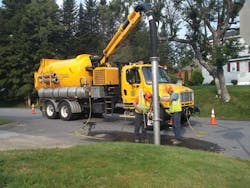About the author: Justin Early, P.E., is project engineer for the city of Lewiston Department of Public Works. Early can be reached at [email protected] or 207.513.3003.
According to the U.S. Environmental Protection Agency (EPA), there are approximately 6,700 regulated small Municipal Separate Storm Sewer Systems (MS4s) in the U.S. that are required to obtain storm water discharge permits as part of the National Pollutant Discharge Elimination System (NPDES) permit program. These permits require municipalities to develop and implement a storm water management program to reduce pollution from storm water runoff and prohibit illicit discharges. As the country continues to grow, more small municipalities will be brought into the NPDES program and required to deal with storm water regulations and the difficult decisions that come with achieving permit compliance.
While there are many integral components to a small MS4 general storm water permit (public education, illicit discharge detection, construction runoff control and more), municipal operations like street sweeping and catch basin cleaning go a long way toward keeping water bodies clean by preventing sediment, sand, litter and other polluting debris from entering the storm water system. Unfortunately, these operations often are costly, and municipalities may struggle to determine how to pay for them.
The city of Lewiston, Maine, encompasses 35.54 sq miles and has a population of 36,592 people, according to the 2010 census. City wide, there are 189 miles of roads and 4,682 catch basins. The Urbanized Area, which is the urban cluster area that the MS4 general permit regulates, is 17.8 sq miles. Within this 17.8-sq-mile area, the city maintains 158 miles of roads and 4,357 catch basins. Cleaning this many miles of roads and thousands of catch basins on an annual basis requires a multifaceted fleet of equipment and personnel.
Lewiston’s Procedures
As soon as the winter snow melts and weather predictions indicate that no further storms are forthcoming, two street sweeping shifts (day and night) are established to address the buildup of sand left on the streets.
Crews begin sweeping operations by starting with the principal urban arterials. Once these have been cleaned, the operation continues with minor urban arterials, then urban and rural collectors, and, finally, local roads are swept.
“Before the streets can be swept, however, the sidewalks must be cleaned,” said Jon Elie, highway operations manager for the city of Lewiston. “To accomplish this, the city utilizes three sidewalk sweepers to push accumulated sand into the street, where it is then swept by the larger street sweepers. Power brooms are used to sweep around obstacles and in depressions that the sidewalk sweepers cannot get to. A water wagon is also used on dry days to control the dust.”
To clean its 189 miles of roads, the city of Lewiston uses three mechanical sweepers and one vacuum sweeper. The vacuum sweeper typically follows the mechanical sweeper to pick up remaining debris, litter and fine particulates. The material is either taken to a permitted fill site owned by the city or to private property owners requesting
fill material.
Compliance
The Maine Department of Environmental Protection (MeDEP) General Permit for Discharges of Stormwater from Small MS4s requires that a program be developed to evaluate and, if necessary, clean catch basins that accumulate sediment at least once every other year.
To accomplish this, the city of Lewiston uses a two-man crew to operate the city’s 2005 Freightliner 2100 Series catch basin cleaner. The work begins as soon as temperatures are above freezing and continues throughout the summer and fall, weather permitting. On average, the city cleans about 2,400 catch basins a year and accumulates approximately 250 cu yd of catch basin grit. The grit is taken to a permitted dumping area at the city’s operations center, where it is allowed to dry out. Once dry, it is then taken to the city’s solid waste facility.
Funding Challenges
Probably the biggest challenge municipalities face in implementing a street and catch basin cleaning program is how to pay for it. The initial purchase of the specialized equipment, along with maintenance, fuel and personnel costs, can put a strain on an operating budget. Lewiston’s 2005 Freightliner 2100 Series catch basin cleaning truck was purchased in 2005 for $143,867.
“This same unit would now cost approximately $358,000, and [Lewiston’s truck] will be up for replacement in the next five years, depending on how well it holds up,”
said Phil Brienza, Lewiston’s fleet
operations manager.
In 2006, the city of Lewiston adopted a storm water utility fee to help fund the many requirements of the NPDES permit, including street and catch basin cleaning. In fiscal year 2014, the city collected approximately $2.6 million in storm water utility fees.
The storm water utility fee is calculated based on the amount of impervious surface a property has. The amount of impervious cover directly correlates to the amount of runoff generated from a property.
With the storm water utility fee, not only do residential and commercial properties pay their share, but tax-exempt properties also are required to pay based on their impervious cover.
Adopting this utility fee actually reduced the city’s mill rate and lessened the property tax burden on a typical single-family home. Property owners are charged a flat rate annually based on a predetermined average impervious surface area for single-
family homes, mobile homes and duplex residential parcels.
Other properties that exceed the average impervious surface area are charged the base rate plus an additional fee for each additional square foot of impervious cover. A credit policy also is in place for property owners who implement certain systems and measures to mitigate the impact of storm water on the city’s infrastructure.
Federally mandated permits like the MS4 can be a challenge to comply with at times, especially for small MS4s like the city of Lewiston. However, because municipal operations such as street sweeping and catch basin cleaning are a vital aspect of storm water pollution prevention plans, implementing and funding these operations is key to achieving permit compliance.


